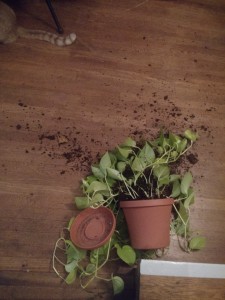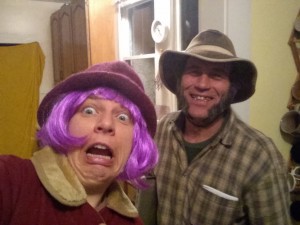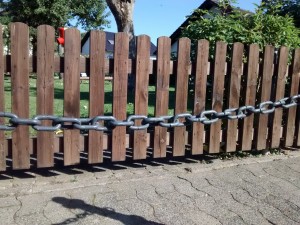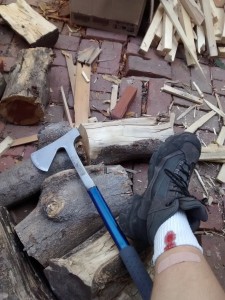
Last week I wrote about dealing with conflict in community. There’s conflict, but then there’s also what I call “housemate drama”, something I’ve experienced thrice in my intentional community. In my book, a conflict has turned into drama as soon as one person stops talking to everyone else or responds solely with insults and accusations. It becomes impossible to work on the original conflict, and everyone else in the community is forced to find ways of managing one housemate’s (passive) aggressive behavior.
Escalation becomes the name of the game. Instead of talking about what happened, the housemate in drama mode announces that they are leaving. Any attempt to have a conversation is shut down, and then the lack of communication and aggression complicates the moving process. When the former housemate is interested in retaliation rather than reconciliation, they do things to “punish” the community, by leaving behind messes, refusing to return house keys, or breaking various agreements and commitments.
Dealing with conflict isn’t easy, but managing housemate drama is much more difficult. What can you do when someone is unwilling to engage in any kind of conflict resolution? How do you deal with someone who just wants to be seen as a victim or tries to turn everything into a fight?
My first reaction is grounding. Housemate drama can feel like a whirlwind that wants to carry me off into crazy-making thought spirals. I get together with other community members often and we provide reality checks for one another. I always wonder which mistakes I might have made, if there wasn’t some way I could have prevented an escalation. I look for ways of improving ways for frustrations to be expressed, maybe at house meetings or rituals. I think about whether there were any early warning signs or intuitions that I may have ignored. In the end, though, I have to remember that I am not responsible for other people’s emotions. While I can support them in managing theirs, I cannot manage their emotions for them. Thankfully I have housemates who are very good at reminding me to “own your shit but no one else’s!”

I also discuss any accusations made against me with my housemates. I want to know if they contain any truth and how I can learn from them. Most of the time they are nothing but projections, but I always check. It is good to remember that I, too, sometimes react to old trauma rather than my current situation. It’s a normal, human thing to do, and I know what it is like to lose my grasp on the Here and Now. I’m always grateful for having friends who help me sort out between what is pure projection, and what accusations contain elements of truth that challenge me to grow.
And I often remind myself and other housemates that this escalated situation isn’t about me, it isn’t about us. My housemates issue the same reminder for me. It’s all too easy to make everything about myself, so the frequent “reality checks” are appreciated. While I don’t always know the story behind an escalated situation, it is clear that when someone shifts from conflict to drama, they are not reacting to me or anyone else in the community. What they are likely reacting to is some experience in their past, which they seem to be re-living to some degree. Either I or another housemate has become the trigger. Maybe I’ve come to represent an abusive ex, a violent parent, or an oppressive employer. There is no way of knowing, but the details don’t really matter. The bottom line is, the escalation, aggression, and hateful behavior is not about me.

Nevertheless, sometimes I am triggered by an insult or accusation made against me. The better the former housemate knew me, the closer to home they can hit. If we were close, they are likely to bring up an accusation that is triggering for me. This is where I lean heavily on outside friends and other community members. They also know my stories, and understand why I am triggered. They hold space for me and give me permission to feel anger, hurt, and disappointment. Often this means that I will be working through some of my own stuff, and while I didn’t chose to do so in the moment, I do my best to welcome the opportunity. As one of my friends likes to say, “awesome sauce, it’s an AFOG – Another Fucking Opportunity for Growth!”
Sometimes it’s another community member who gets triggered by an accusation, and then it becomes my place to hold space for them. Either way, there’s usually quite a bit of space holding and shadow work going around. That can be tiring, of course, but ironically it also makes me value and appreciate my community so much more.

In the midst of the emotional impact, I also need to do my part in mitigating the messy moving situation. This is another area where I believe my community is incredibly strong. I have taken turns with others trying to resolve messy utility situations. Others pitched in repairing damage done to vacated rooms. I’ve traded vehicles with housemates so we could help each other remove junk that a housemate left behind. And once, just as I was wondering about what to do someone’s refusal to return their keys, the house itself came to the rescue. Not two days after I learned that our keys would be held hostage, the weather shifted and the door lock jammed so badly that it needed to be replaced, thereby rendering the un-returned keys useless. As far as I recall, no one has never used spellwork on the moving logistics, but things have had a way of sorting themselves out. Even the most retaliatory moving nightmares became manageable.
Our community was founded almost half a dozen years ago. While we’ve had a number of conflicts, we’ve only had three instances of housemate drama. That’s still three too many for my liking, but as I look back, I recognize just how much I learned through each one. I was a brand new baby Witch the first time and had no idea how to use magic. But it was through the first and second housemate drama experience that I first discovered how to use intuitive magic.
The first time conflict turned into drama, I was completely overwhelmed. I felt deeply hurt, had poor boundaries, acted out my fear, and made painful mistakes. I wanted nothing more than to get together with my housemate and talk about it. I wanted to understand where they were coming from and wanted to explain what had happened to me, to ask forgiveness for the mistakes I had made and to forgive them for theirs. But they stopped talking to me and chose retaliation instead, and I was stunned. I ended up having to show the house to potential new people in the midst of the drama, while an entire room had been rendered unusable by clutter. The process of finding a new housemate ended up being rushed and even after they arrived, I spent weeks trying to sort out trouble with a utility company.

I was beside myself with hurt and anger and agreed to moving in a new housemate who seemed like the exact opposite of the person who had just caused the drama. That was a reactionary move and turned out to be a mistake. The new housemate then caused the opposite kinds of problems. Where one brought tension through excessive cluttering, the other wanted the house to be impossibly meticulous. While one used the house for short-lived impulsive projects, the other wanted a house meeting before making any change. Ever.
The new housemate didn’t stay long. They moved out suddenly and initiated me into my second experience with housemate drama. I was presented with a long list of grievances, but denied any opportunity to respond. I had barely recovered from the first experience, and was already dealing with drama again. I was at a complete loss of what to do. I wasn’t acting, I was just reacting to whatever came my way. I knew I had to take action if wanted to avoid ending up in this situation again.
When the second housemate left, they refused to honor their commitment of painting the room. I could have fought them on the issue, but I was already worn down and chose to use my energy differently instead. I decided that I would paint the room for them, but use the process to transform my frustration and rage into magic. I bought painting supplies and called on my intuition to see what could happen. The results were much better than I had expected. I came to love paintbrush spellcraft so much that I’m dedicating my next blog post to the topic.

One of my housemates commented that my writing about conflict and drama could give the wrong impression about community. They have a point. Most of the time, community living is harmonious, enjoyable, and incredibly enriching. When conflicts happen, they aren’t fun, and housemate drama is a nightmare. Managing drama three times in half a decade is three times too many, but even if it were to happen again, it wouldn’t stop me from living in community. Each time I went through drama, I learned. I looked at my own shadows and I grew. I got better at preventing drama. I learned to have healthier boundaries and how to uphold them. I’ve learned to be stronger and more compassionate. I even discovered how to use intuitive magic! And, above all, I’ve become deeply grateful for friends and community members who are willing to walk through the storm with me. In the end, I still love living in community and wouldn’t trade it for anything.














